People joke that you can catch adrenal fatigue just as easily as a head cold in New York City.

Especially if you’re a woman during the holiday season, juggling family obligations, end of year office grunt work, and a finely calibrated hormonal motherboard. So yeah, that’s everyone right?
In reality, adrenal fatigue is not something you catch, but rather a slow unraveling.
These little glands are in the endocrine chain of command (along with your thyroid), and are in charge of regulating the body’s stress response through adrenaline and cortisol, our chief fight or flight hormones.
If you’re a member of the HashiPosse or your thyroid is out of commission, the adrenals have to work extra hard to generate energy for the body. It’s the actual scenario of “running on fumes.” Without proper thyroid hormones to keep the wheels moving, you might be barreling full speed ahead on adrenaline and cortisol alone.
Unfortunately, like any well-oiled, but overused machine, your adrenals can only hang in there for so long without a break. Adrenal fatigue is what happens when you’ve used up all your cortisol reserves due to constant daily stress, another hormone imbalance (like hypothyroidism), or often, both.
I’ve struggled with adrenal fatigue symptoms on and off for the last decade, but it wasn’t until this past spring that I actually took a test. Since then, I’ve been meaning to write this deep dive on the best natural treatments, supplements and lifestyle strategies we can use to support our adrenals and give them a much needed recharge.
Below I get into what adrenal fatigue testing looks like, whether or not it’s actually worth knowing for sure, common symptoms, and ideas for recovery. Some include the usual de-stressing activities—tubbing, meditating, skipping your 3rd ugly sweater party. Things we should be more equipped to do in cold, cozy January. But I’ve also given some more specific tips that I use in my course 4 Weeks to Wellness for getting people back on track.
In the meantime, read on for more on adrenal fatigue (how it differs from adrenal insufficiency) and how to recover from it.
With health and hedonism,
Phoebe
HOW TO TEST FOR ADRENAL FATIGUE
There’s much debate in the medical community about whether adrenal fatigue is an actual syndrome. The full-blown expression is Addison’s disease, also known as adrenal insufficiency, and you can test for it using the ACTH Stimulation Test, where cortisol levels are checked in the blood before and after a synthetic hormone (ACTH) is given by injection.
Adrenal fatigue, on the other hand, can be tested for using an at-home saliva test, which is more convenient, but not always covered by insurance. The feeling that testing for adrenal fatigue is unnecessary has also been seconded by plenty of holistic practitioners, since the reality of the matter, as I joked earlier, is that there are so many women who could benefit from more adrenal support.
For what it’s worth, I took the Labrix at-home saliva test for Adrenal Hormone Function. It involves spitting into a tube upon waking, shortly after waking, noon, evening and night. Your cortisol levels have a natural rise and drop throughout the day, so mapping the pattern via saliva is a more convenient way than via one blood test, since the levels can fluctuate quite a bit depending on when the blood is drawn.
The Adrenal Stress Index (ASI) test is another option that’s recommended by Dr. Jolene Brighten, one of my go-to’s for anything hormone health related.
Many practitioners believe that the thyroid is the true canary in the coal mine for adrenal fatigue, and alternatively, an even bigger culprit of potential exhaustion, weight gain and malaise. Before getting too bogged down with adrenal fatigue tests, I’d recommend getting a full thyroid panel. Most doctors only test for TSH, which is only part of the picture. If they won’t order more numbers for you, the Paloma At-Home Thyroid test is an excellent option for taking matters into your own hands.
WHAT ARE THE SYMPTOMS OF ADRENAL FATIGUE?
First, let’s talk about what proper adrenal function looks like so you can better spot disfunction.
Ideally, your cortisol levels are highest in the morning, around 8am. Think of it as the body’s natural caffeine, helping us stay tuned in during the day. It gradually tapers off through the afternoon and evening, and hits its lowest point at 3am, since you need very little motivation while sleeping.
Things can go haywire in a variety of different ways. If you find yourself waking up in the middle of the night, it’s a sign that your cortisol might be spiking too early. More commonly, what leads to adrenal fatigue is ongoing high levels of cortisol during the day, thanks to too much coffee, stressful work schedules, disrupted sleep, and general anxiety.
You might be one of those high-functioning stress cases that feed off of the energy of cortisol. But when levels stay elevated, that’s a recipe for burnout.
When someone has adrenal fatigue, their tests will indicate that cortisol has flat-lined. You might still be following the right pattern throughout the day, but it’s far below the normal levels of production. This is adrenal fatigue at its core.

You’ll find many lists out there for adrenal fatigue symptoms, but I’m going to unpack some of the most common ones for you one by one so you can understand how these issues are interconnected and relate to your fluctuating hormone levels.
Exhaustion and fatigue: If you feel yourself dragging throughout the day, even after plenty of sleep, or dozing off during meetings, that’s an indication that your cortisol levels have been exhausted, and your whole body feels it. If you’ve ever pulled all-nighters to get through exams, then gotten home and slept for 5 days straight (and potentially also come down with the flu) this is low grade adrenal fatigue. In the real world, our exams don’t come along once a quarter, and it’s when a finals week situation turns into a full month of added stress and bad habits, that things can really go awry for your adrenals.
Weight gain: A very common symptom of adrenal fatigue, especially for women, is packing on pounds around your waistline. I’ll often hear this complaint from people in my program: “I’m working out constantly and eating the healthiest diet ever, and I can’t seem to lose a pound.” This really comes down to hormones. When your cortisol is spiking constantly (and this, by the way, can also happen from high intensity exercise) it indicates to your body that you’re in a life or death situation. Back in the bush, that meant food resources might be scarce for a while, so your body converts all the excess energy it can into fat for the “long winter” to come. Counterintuitively, skipping that high intensity workout might be a better course of action to lose weight if your adrenals are fatigued.
Disturbed sleep and waking up in the middle of the night: I already mentioned how cortisol patterns being off might cause a 3am wake-up. But it can also happen from unstable blood sugar. Which, of course, is usually one of the culprits of any hormonal imbalance. When your blood sugar is on the fritz, it might cause you to be hungry all the time, even an hour after a meal. You crave sugar and simple carbs, even though those things deregulate your blood sugar even further. A 3am wakeup is your body crying out for energy, and one way to fix it is to drink something high in fat before bed that can nourish you overnight. Mix some coconut oil into your nighttime tea, or drink a golden milk latte with coconut milk. Like high intensity exercise, it can also be counterintuitive for weight loss, but restricting calories or intermittent fasting will only make your body more stressed about its reserves and want to hold onto them.
Dehydration and dry skin: I talk about this one a bit in the water chapter of The Wellness Project book. Since the adrenals sit just above your kidneys, their other main function is to control your water levels. The more stress you have, the more hormones and salt they send out to circulate in the body. When your stress levels fall, all that sodium needs to be evacuated. Just think of a nervous puppy that has to pee all the time. That’s the stressed-out you, constantly flushing fluids, along with sodium, down the toilet. People with adrenal fatigue can drink their full daily water quota and still be dehydrated. If your lips are perpetually chapped and your skin is dry, yet you’re drinking plenty of water, it might be an indication that some electrolyte supplements are needed.
Digestive issues: You may remember from middle school science class that our nervous system has two modes: sympathetic and parasympathetic. The first is fight or flight, the second rest and digest. Needless to say, when we aren’t spending enough time in the latter, it can affect our stomach and gut. Elevated levels of cortisol can reduce levels of good bacteria in the gut, leading to more digestive issues down the line, even once cortisol reserves are depleted. IBS and SIBO are common overlapping issues.
Anxiety and depression: Feeling on edge is a natural byproduct of too much cortisol, and the downstream effect of having too little can lead to depression. Also, given the powerful studies linking a damaged microbiome to depression and mood disorders, it’s no wonder why after periods of intense stress and adrenal burn out we might feel symptoms of depression.
Here are some other common indications of adrenal fatigue:
• Body aches and soreness
• Dragging ass out of bed in the morning
• Blood sugar imbalance / sugar cravings throughout the day
• Getting sick all the time
• Breakouts and acne
• Low libido (see depression above)
• Brain fog and memory loss
• Poor circulation and dizziness
• Irritability and mood swings
• Hunger shortly after eating
• Feeling at the end of your rope / snappish / about to crack
ADRENAL FATIGUE SUPPLEMENTS THAT SUPPORT RECOVERY
B Vitamin Complex: Tends to be deficient in people with adrenal fatigue (and Hashimoto’s for that matter!)
Liquid B12: If you can do at-home injections, even better for absorption.
Adaptogens: Those commonly used to support adrenals are ashwagandha, ginseng, holy basil, and rhodiola. Careful with blends, however, as not every adaptogen is for everyone.
Magnesium: Magnesium is a natural muscle relaxant and is especially helpful for calming the nervous system. To combat a deficiency and help with sleep, I recommend reading this post on using magnesium for sleep. This brand is my favorite for magnesium supplements. If you just want the self-care and relaxation, use a magnesium spray or a good old Epsom salt bath.
Electrolytes: Coconut water has natural electrolytes, but if you’re trying to balance your blood sugar at the same time, it might not be ideal. Something like this that’s sugar-free and can be added in drops to your morning water would be great.
Vitamin C: Helps with absorption of other vitamins and minerals, plus hydration.
THE BEST NATURAL TREATMENTS AND STRATEGIES FOR ADRENAL FATIGUE
If developing adrenal fatigue is a slow unraveling, you have to think of recovery as a long, steady climb back up Health Mountain. You know I already think of everything this way, but with healing your adrenals it is especially true. The process could take up to a year. It’s a marathon not a sprint.
That said, you don’t have to be perfect every day. You can, however, live every day with your adrenals in the back of your mind. For me, that has meant staying in more than I go out, setting myself up for success with my work expectations (which, as a self-employed blog lady means that the high bar usually comes from ME), and reducing caffeine to only when necessary.
In general, the themes are pretty obvious: rest as much as you can, reduce stress, eat an anti-inflammatory diet that doesn’t put added stress on the body, choose gentle movements, hydrate, sleep. You know, The Wellness Project. (Wink)
Here are some of my favorite healthy hedonist tips for adrenal fatigue:
Regulate Your Blood Sugar with a Vice Detox: If you’ve read The Wellness Project, you know that 30 days without caffeine, alcohol and sugar was as painful as it was beneficial. Part of getting your blood sugar and hormones back on track is giving your liver a boost so it can eliminate all the excess. My favorite way to do this is to get out of my own way. If this sounds miserable but you want to give it a try, we do a mini vice detox in my 4 Weeks to Wellness program and I have a ton of tips to make it easier. These 3 vices also are stimulants that increase cortisol and stress in the body, so it’s important to find moderation on going forward.
Eat Consistent Meals with Fat and Protein in the Morning: Going completely carb-free or intermittent fasting—two big trends right now—is probably not right for you if you have adrenal fatigue and your blood sugar is all over the map. A work around is to get a lot of healthy fats into your meals to make you feel full for longer, and to make sure to start and end the day with a good dose of them. If there’s any meal to go carb-free, it’s in the morning. This is called “carb cycling.” One study showed that people with cortisol issues were able to reprogram their curves by eating low-carb breakfasts, moderate amounts in the afternoon, and higher amounts of healthy carbs in the evening. See below for what that means.
Choose Complex Carbs: People are always talking about how you should eat “whole foods, ” but whole wheat bread does not a whole food make. The less processed an ingredient is, the better. Pasta made from brown rice flour is healthier than bleached white flour, yes, but eating a bowl of whole brown rice is far better. In general, whole foods—meaning literally whole foods cut into pieces and not pulverized by an industrial grinder—keep your blood sugar down and your gut bacteria happy, while simple carbs, though easy to digest, cause more long-term inflammation. Stick with brown rice, quinoa and sweet potatoes.
Add a pinch of sea salt: Salt has gotten a bad rap in the age of processed foods, despite the fact that it’s an essential nutrient. Salt is in the makeup of virtually all our bodily fluids, which means we’re constantly losing it in the form of sweat, urine, and tears. I recommend pink Himalayan sea salt because it’s less processed and thus retains important minerals that also aid in absorption and support electrolyte balance. I try to add a pinch of it to my morning lemon water or smoothie.
Make bone broth the new coconut water: Bone broth is literally so hot right now. If you want to maximize absorption, this is a much better option than sugar-packed coconut water. As the bones simmer for hours, they release amino acids, collagen and nutrients that help your body make the most of the liquid you put in it. It turns out that homemade chicken soup is just as good for your immune system as it is for the soul. And that’s especially important when you’re healing adrenal fatigue and your body might not be able to fight off pathogens as readily. It’s also a salve for your gut. I have some great recipes in my book, SIBO Made Simple.

Don’t Do High-Intensity Workouts at Night (or At All): When you have adrenal fatigue, gentle and slow is better than fast and loose. Think pilates, yin yoga, walking, biking outside, or anything leisurely in nature. Cardio kickboxing is probably off the table, but especially at night when it can create an artificial cortisol spike and disrupt your sleep patterns. Cortisol and melatonin work in tandem, and the former needs to drop, for your chief sleep hormone to take over.
Get 8+ Hours of Non-Disrupted Sleep: Yes, that’s easier said than done. If you’re doing everything right from a lifestyle perspective—not drinking caffeine after noon, keeping your blood sugar stable, getting gentle exercise in the morning, keeping a consistent wake-up time, avoiding blue light before bed—you might want to explore these natural sleep aids to get the ball rolling.
Take a bath before bed: A drop in body temperature is a key prelude to sleep. If your internal thermostat is off, one way to hack it is to take a twenty-minute bath or shower. Though it’s counterintuitive that a hot tub will cool your body temperature, the sharp rise brought on by the warm water will be followed by a sharp fall once you’re out. Adding some relaxing lavender bath salts and sipping some ginger tea while in there is a sleep prep triple threat (in a good way). Plus, all these things are also great for de-stressing.
Choose a sacred night to refuel: I know that picking and choosing social plans so I can get eight hours of sleep will make me a better friend to others and myself. It’s not just alcohol or sugar or gluten, but the hustle and bustle of a night on the town that can overwhelm a sensitive system recovering from adrenal fatigue. I try to say yes to adventures that feed my spirit, not obligations that feel like drudgery. And a few nights a week—Sunday and Monday work well—I keep the schedule clear to have some downtime and catch up on sleep.
Have any more questions about adrenal fatigue recovery? Please leave them in the comments.
Need more help refining your habits around diet, sleep, detox, movement and more? Let’s work together to create your path forward. My 4 Weeks to Wellness Course might just change your life. With 4-weeks worth of elimination diet-friendly recipes that are gluten, dairy, corn, soy and refined sugar free, not to mention tasty AF, it’s a perfect way to explore your food sensitivities and heal inner and outer chaos. Plus, one of the weeks is completely dedicated to overhauling your sleep hygiene, stress management and morning routine! Beyond natural remedies, I’ll help you set up all the rituals you need for a good nights sleep and recharged adrenals for the long haul.



My holistic MD noted, after a couple of blood tests (a year apart,) that I was kinda low in mineral salts, which he said could be linked to adrenal fatigue. I hadn’t noticed being tired, I thought I was just slowing down owing to age. But after increasing salt in my diet didn’t work, he gave me a replenishing formula to add to a quart of water I had to drink. After a month I was incredulous. I didn’t know that I could feel as energetic as I did when I was younger! It affected everything when I got better – my concentration, my ability to handle a lot of work and the stress that came with it. So I highly recommend the electrolyte approach you write about. Thanks for this amazing guide!
what brand do you take?
Did you order the test to take at home on your own? I’m a little confused by the link – is this something available on Amazon or similar? Thanks!
I got it from my doctor. You might be able to order through the lab but not on amazon
“If you feel yourself dragging throughout the day, even after plenty of sleep, or dozing off during meetings, that’s an indication that your cortisol levels have been exhausted.” Please, could you explain more on this cos I feel like that sometimes? Thanks.
I have adrenal fatigue, it’s nit horrible but it’s below normal. I struggle with being hungry. For me, when I eat gluten free grains, it makes the cycle of feeling like I have low blood sugar even worse. Is this normal? How can I fix this or will it just take time? I’ve decided to gut out grains and get my complexcarbs from butter nut squash and sweet potatoes.
Dollar general has a liquid B complex with B12 for $5. and often a buy one get one free option thats when i stock up. They also have much cheaper vitamins than other stores. calcium magnesium zinc i take 2 before bed and one in the morning does wonders to help me sleep. I got my son off ADD meds with vitamins and am looking into Adrenal issues for me now.
I have also resently stated Lemon Balm and have been getting a lot of energy back too.
thanks for sharing Tanya! Glad you’re feeling better.
Nice article to know much more about adrenaline fatigue. It is now very important biological disorder and ai have suffered since last few months. So for me this article is very much important mainly to know its biochemical etiology. I have been prescribed to take vitamin B12 vape for treatment if adrenaline fatigue as I have already been informed that vitamin B12 supplementation is very much effective.
Really it is a very good article for me to get some vital information about adrenal fatigue. I have suffered a lot from this syndrome and my life was pathetic. I have heard about the vitamin b12 for treatment of anxiety and depression on adrenal fatigue and have decided to use vitamin vape pen Australia as a supplement.
Did you get your adrenals tested after you healed your sibo or during?
Excellent article, thanks! I wondered why IF hasn’t worked for me, after many tries. Having had my thyroid removed 16 years ago, I’m perpetually hypo. I did test low 2 years ago, but never connected it to IF
I hadn’t saw being worn out, I thought I was simply hindering attributable to age. In any case, in the wake of expanding salt in my eating routine didn’t work, he gave me a renewing recipe to add to a quart of water I needed to drink. Following a month I was wary. I didn’t realize that I could feel as enthusiastic as I did when I was more youthful!
As far as morning workouts with adrenal fatigue go (either yoga or walking), is it best to do them fasted or with food in your system? I can’t seem to find the answer to that anywhere.
I think it depends on what makes you feel better. Some women don’t do great with intermittent fasting, others do.
Thank you for helping me understand what is adrenal fatigue and what it can lead to? I am going to take the test soon. I will go for a home saliva test. I have high stress levels for sure but I also have B12 deficiency and therefore, I am thinking of buying a herbal diffuser pen because I also have a bad habit of smoking and vaping vitamins can help me quit smoking. When I smoke too much at night it is difficult to fall asleep and high stress levels are one reason I smoke. What do you think is a good way to buy a B12 vape pen?
I’m not sure how to incorporate carbohydrates due to the leaky gut that has occurred from adrenal fatigue. Im positive i brought this on by intermittent fasting for 26 months. Im so angry and very sick.
Do you happen to have silver amalgam fillings in any teeth at all?
This is a superb article on Adrenal fatigue, one of the best I have seen. Thank you.
Fantastic article. I had a kidney removed when I was 11 due to a traumatic accident. I suspect they took out one of my adrenals though I’m not 100 percent sure. Anyway, I definitely have adrenal fatigue symptoms. Thanks